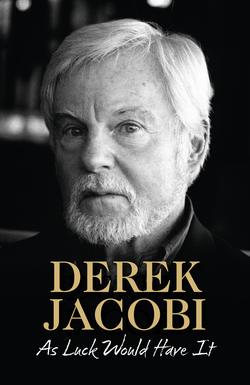Читать книгу As Luck Would Have It - Derek Jacobi - Страница 6
PROLOGUE
ОглавлениеThe boy with the veil
It shimmers and enchants; it belongs to a secret, magical, forbidden world, and I have always wanted it.
She keeps her glorious white silk wedding veil – part of her wedding trousseau – in her wardrobe, and I sometimes sneak into my parents’ bedroom and gaze at it. And then one day in 1945, when I am six years old and they are both out at work, I creep into their room, open the wardrobe and carefully lift out the veil. I drape the gorgeous white material round my shoulders and over my head, and, swishing it around and puffing myself up like mad, I go out of the house and parade up and down Essex Road.
We East London kids like to play out in the Essex Road and the adjoining streets, and do so in complete safety. The streets of England are our playground. We make dens in the front gardens, and dream and imagine we are other people and characters. From as early as I can remember I have been excited by the idea of dressing up, and this is my first recollection of being in costume.
Perhaps it is to impress Ivy Mills that I have worn Mum’s wedding veil, though my first girlfriend is Winnie Spurgeon. We play hopscotch, and doctors and nurses, with two other girls in the street and we chalk our initials on the pavement. Yet it is Ivy, the prettiest of the three, who has now become my favourite. The boys in my class start to chalk on the pavement, ‘DJ LOVES IM’, and I will do anything to please her.
But on this day I know I’m not just pleasing Ivy. I know in some instinctive way that I am performing, perhaps for the first time in my life, and suddenly all the world – or at least Essex Road – is my stage. And in transforming myself, and entertaining Ivy, I have a sudden insight – a sense of who I am, and who I could be, when I’m not just being myself.
I can become other people in my imagination – but can’t we all? I can be a hero or villain, strong, weak, timid, arrogant, crafty, trusting, passionate, destructive, nurturing ... I can be anything I want to be. After all, I’m a human being, full of everything you can possibly imagine.
Of course Ivy, Winnie and my friends laugh at me and are most impressed. I play up to it for all it’s worth – strutting, waltzing, skipping, galloping around the pavement until my veil is finally shredded to bits on the front garden privets.
Mum was back home when I returned. She was waiting.
‘Well, this is it,’ I thought. ‘She’s going to go completely bananas at me when she finds her precious wedding veil torn into tatters!’
I was starting to cry as I stood there ready for her to tear me to shreds – just as I had torn her wedding veil.
But her reaction wasn’t anger: she hardly told me off at all.
From that moment I continued to fancy myself in the veil. The idea of the veil stuck in my mind as a garment that, whoever wore it, both concealed and revealed the person. Yet the actor in me, the dressing-up part of me, was a mystery which I never could understand, right from the beginning – and that still remains the case today. I can only describe it as a magical process.
Later I would say that the actor must somehow have got in there right from the start, at the moment of conception, but God knows where he came from. Was I simply born an actor, as grandly titled by Edmund Kean – ‘A prince and an actor’ – a part which I was to play later in Jean-Paul Sartre’s play? Even then, in that earlier time as a child, the first part I ever acted was a prince, and this prince was by no means to be the last.
We take it for granted that actors can act; the skill or craft – or the trick – is to make people believe they are seeing somebody real on stage, not an actor acting. Ideally they should leave the theatre talking about the person they’ve seen and the emotions they’ve felt, not saying, ‘Gosh, isn’t he a good actor?’ That suggests that it has been merely a spectator sport, and the actor has been showing off. Audiences or viewers want to believe they have been in the presence of a real person.
But theatre, film and television are trickery; a bit of a performance works, and I glow to myself. I know I’ve managed to carry it off, and it is a moment of pure, private pleasure. As every actor does, I have felt the power and the glory of trickery and mystification.
Yet who would ever have suspected that that little boy who was so excited at putting on his mum’s wedding veil would in time come to play real and fictional people – Hamlet, Lear, Hitler or Alan Turing, and a great host of others? Who could ever have known that he would come to live in the palaces or grand locations of his games and imagination, or re-inhabit in stories the real places, such as Bletchley, or the suburbia-like lower-middle-class Leytonstone, which had an importance in his early life?
It was the fate and destiny established way back in my past, in my childhood or before, that there would be many, many parts, well over the 200 mark through my seven ages, behind which I would hide my true self, conceal myself as behind a veil, yet at the same time be able to reveal some of who and what I was.
